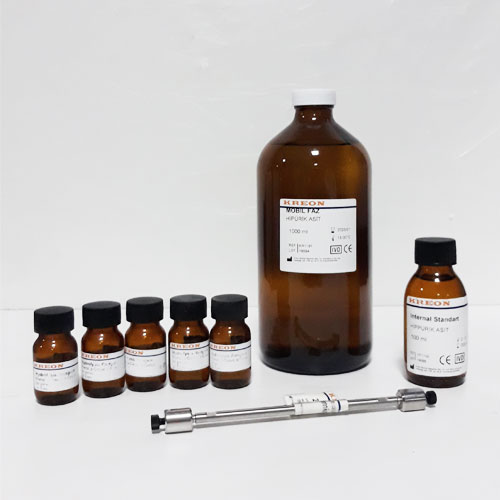Hippuric Acid (Urine) HPLC
Hippuric Acid (Urine) For HPLC
INTENDED USE
KR119 Reagent kit for the HPLC determination of Hippuric acid in urine.
KIT SPECIFICATION
Contents for 100 analyses
|
Cat no
|
Quantity
|
Reagents
|
|
KR1191
|
1000 mlx1
|
Mobile Phase
|
|
KR1192
|
100 mlx1
|
İnternal Standart
|
|
KR1193
|
0.5 mlx5
|
Urine Calibrator
|
ACCESSORIES
|
KR1195
|
1 adet
|
HPLC column for the analysis of Hippuric acid in urine.
|
|
KR1199
|
100 adet
|
Autosampler vial with teflon caps
|
CONTROLS
|
KR1197
|
0.5 ml x5
|
Urine Control, Level I
|
|
KR1198
|
0.5 ml x5
|
Urine Control, Level II
|
INTRODUCTION
Hippuric acid, o-, m-, p-Methylhippuric acid, Mandelic acid and Phenylglyoxylic acid are the main metabolites of the organic solvents: toluene, xylene, and styrene. These toxic compounds are widely used throughout various industries, making the determination of their concentrations relevant to occupational health in a number of different professional fields. Due to their high levels of volatility, they primarily enter the body through inhalation and are rapidly absorbed through the lungs. For occupational health monitoring of people who are exposed to these compounds at work, measurement of the metabolites in urine is more reliable than determining the concentrations of the toxins in the blood, due to their very fast metabolism rates.
For any hazardous substance or its metabolite, a BTV (Biological Tolerance Value) is defined as a threshold value for maximum absorption in biological material.
EQUIPMENT AND INSTRUMENTAL PARAMETERS
The analysis of Hippuric acid requires a HPLC including gradient system withHPLC pump, autosampler, autoinjector and UV detector.
The use of a solvent degasser prevents air bubbles and ensure a stable baseline.
Sampler: Injection volume 5 μl, analytical run time 20 min..
HPLC pump: Flow rate 1.0 ml/min is recommended
Column temperature: Ambient (~25 °C)
FLD detector: 225 nm
COLLECTION AND STORAGE OF PATIENT SAMPLES
The sample material is 24 hours urine. Storage life at room temperature is about 1 day, refrigerated (+2 to +8 °C) up to 1 week and frozen below -20 °C up to 6 months.
SAMPLE PREPARATION PROCEDURE
25 µl urine sample is added to vial with teflon cap
1 ml internal standard is added.
Vortex the mix for 10s.
Centrifuge at 14 000 rpm for 10 min.
Samples prepared as above can be stored at ambient temperature for about 24 hours, at
+2 to +8 °C up to 36 h, frozen below -18 °C up to 3 months.



